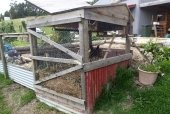Our composting coop - its a few months old now and is working really well for us and the chooks seems pretty happy too. There are no solid surfaces to clean out, the only surfaces in there are either mesh, or narrow bits of wood. No need to clean, all the birds poo goes onto the heap along with ALL of our household food scraps. We used to have a chook bin and then a worm bin for the things the chooks didn't eat and a 3rd bin for the stuff that the worms didn't eat .... that was way way too much faffing about for my liking.
This design works well on our slope, but I am sure that you could work something out on the flat. Have others tried this sort of thing? Its just an exagerated deep litter system really, but rather than having a seperate deep litter area with a festering coop attached, this just puts them together. I went to some effort to rodent proof it by burying the corrogated iron 20cm or so around the edge.
We have an attached electranet fence which we move around too.
First post, Be gentle.











